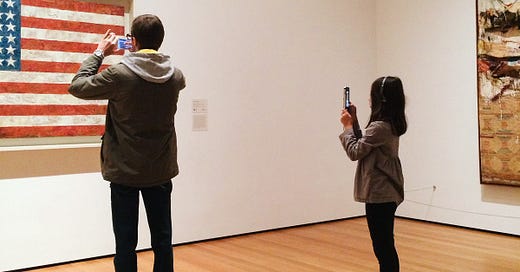Stop living though your lens. The compulsion to document and share everything.
Remember the feeling and not what it looks like.
Last Friday on the 47th–50th St. Rockefeller Center subway station as I was headed towards the turnstile, my right foot slid on something indistinguishably squishy. I fell hard. Right on my ass. It was like one of those cartoon falls when a character slips on a banana peel and falls backwards, complete with cheeky sound effects and a laugh track if you’re old enough to remember when cartoons had laugh tracks.
What I remember most, however, is that a woman watched me fall and walked right by me without even a glance my way as I struggled to pick myself up. As my kids would say, “RUDE!”
I made my way down to the platform right as a train was pulling in, took a seat, and posted about it on Threads on my ride home. I think I was still shaken by that woman practically stepping over my crumpled body, that I was seeking some sort of consolation from other strangers. Maybe I was also annoyed because I swear I will die on this hill when I say that New Yorkers are really friendly and helpful despite whatever dystopian image conservatives are trying to spin. NYC is a dangerous hellscape, if you weren’t aware, full of criminals and unsavory characters.
Hours later, still sore and tingly and recovering in bed with an ice pack, I kind of regretted posting about the fall on social media and berated myself for being so impulsively needy and attention-seeking. Not only was my fall very public in front of all of New York to see, but I was broadcasting it further to more people who wasn’t even there to witness it in the first place (yes, I realize the irony of writing about this here).




